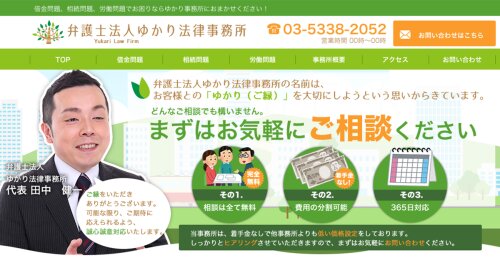Best Employment Rights Lawyers in Tokyo
Share your needs with us, get contacted by law firms.
Free. Takes 2 min.
List of the best lawyers in Tokyo, Japan
About Employment Rights Law in Tokyo, Japan
Employment rights in Tokyo, Japan, are governed by a combination of national labor laws and local regulations aimed at ensuring fair treatment and protection for employees. These laws cover diverse areas such as working conditions, wages, discrimination, termination of employment, and workplace safety. The Japanese labor market is known for its unique practices like lifetime employment and seniority wages, which add another layer of complexity to employment rights issues.
Why You May Need a Lawyer
Employment disputes in Tokyo can arise from various situations, which may necessitate legal intervention. Common scenarios include wrongful termination, discrimination based on gender or nationality, disputes over unpaid wages or overtime, harassment in the workplace, and breaches of employment contract terms. Seeking a lawyer's expertise can help employees understand their rights, navigate complex legal processes, and achieve a favorable resolution.
Local Laws Overview
Key aspects of employment law in Tokyo include the Labor Standards Act, which sets minimum standards for working conditions, wages, and hours. The Equal Employment Opportunity Act prohibits discrimination and ensures equal treatment in the workplace based on gender. The Industrial Safety and Health Act focuses on maintaining safe workplace environments. Employers are also bound by rules concerning employment contracts, mandatory paid leave, and procedures for layoffs or dismissals.
Frequently Asked Questions
What are my basic rights as an employee in Tokyo?
Your basic rights include receiving at least the minimum wage, safe working conditions, non-discriminatory treatment, and entitlement to paid leave. You are also entitled to be informed about the terms of your employment contract.
Can my employer fire me without cause?
Japanese employment law generally protects employees from being dismissed without a justifiable reason. Employers must have a legitimate cause for termination, such as gross misconduct or financial necessity.
How do overtime pay and working hours operate?
The standard workweek is 40 hours, and anything beyond that is considered overtime. Employees are entitled to a premium pay rate for overtime work, generally at least 25% above the normal wage rate.
Am I entitled to any specific leave as an employee in Tokyo?
Yes, you have a right to annual paid leave, which starts at ten days per year, and other types of leave such as maternity, paternity, and childcare leave.
What should I do if I'm experiencing discrimination at work?
If you believe you are facing discrimination, document the incidents, and consider seeking advice from a legal professional or consulting with authoritative bodies like the Labor Bureau.
Is harassment prohibited in the workplace?
Yes, harassment is prohibited by law. Employers in Tokyo are required to take measures to prevent and address harassment in the workplace.
What happens if my employer goes bankrupt?
If a company goes bankrupt, employees may be entitled to receive unpaid wages and other benefits from a government-managed insurance system.
Can I negotiate the terms of my employment contract?
Yes, while employment contracts may typically conform to company policies, based on your skills and experience, you can negotiate terms like salary and working hours.
How are disputes usually resolved?
Disputes in Tokyo are often first addressed through internal settlement mechanisms or negotiations. If unresolved, they can be taken to labor tribunals or court for a more formal resolution.
What are my options if I’m not a Japanese citizen?
Foreign workers in Tokyo enjoy the same rights as Japanese citizens in terms of labor conditions and protections. If you encounter issues, consult with a lawyer specializing in employment and immigration law.
Additional Resources
Several governmental bodies and organizations can assist those seeking advice on employment rights in Tokyo, including the Tokyo Labor Bureau and Japan Labor Standard Office. Non-profit organizations and labor unions also frequently provide free consultations and support.
Next Steps
If you need legal assistance regarding employment rights, start by gathering all relevant documents, such as your employment contract and any correspondence with your employer. Consider speaking with a professional lawyer who specializes in employment law to get tailored advice and possible representation. It’s also advisable to reach out to local governmental bodies or worker’s unions for guidance and support.
Lawzana helps you find the best lawyers and law firms in Tokyo through a curated and pre-screened list of qualified legal professionals. Our platform offers rankings and detailed profiles of attorneys and law firms, allowing you to compare based on practice areas, including Employment Rights, experience, and client feedback.
Each profile includes a description of the firm's areas of practice, client reviews, team members and partners, year of establishment, spoken languages, office locations, contact information, social media presence, and any published articles or resources. Most firms on our platform speak English and are experienced in both local and international legal matters.
Get a quote from top-rated law firms in Tokyo, Japan — quickly, securely, and without unnecessary hassle.
Disclaimer:
The information provided on this page is for general informational purposes only and does not constitute legal advice. While we strive to ensure the accuracy and relevance of the content, legal information may change over time, and interpretations of the law can vary. You should always consult with a qualified legal professional for advice specific to your situation.
We disclaim all liability for actions taken or not taken based on the content of this page. If you believe any information is incorrect or outdated, please contact us, and we will review and update it where appropriate.














